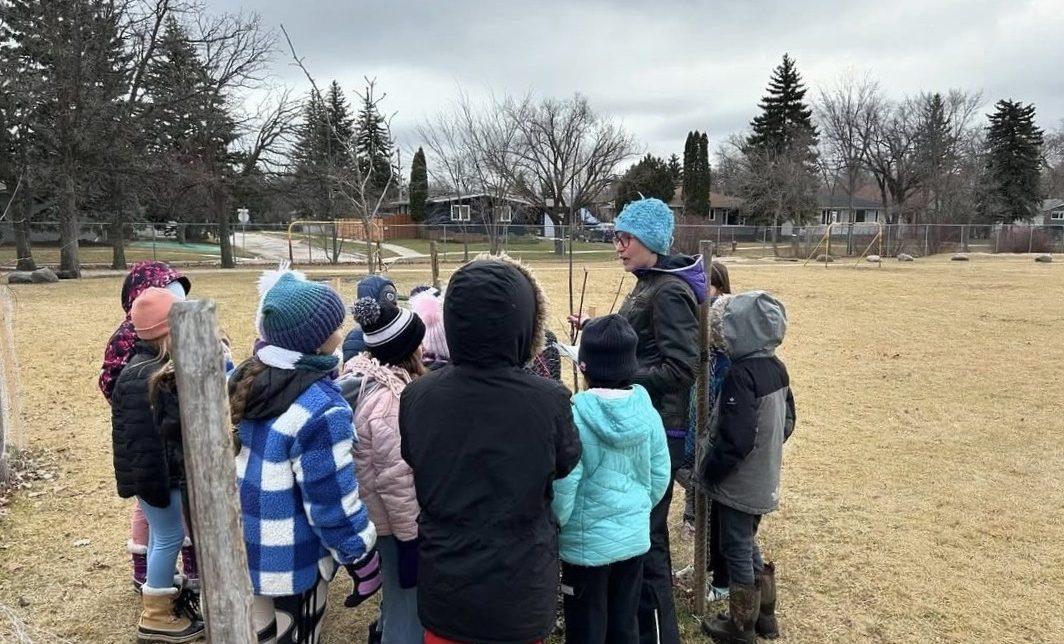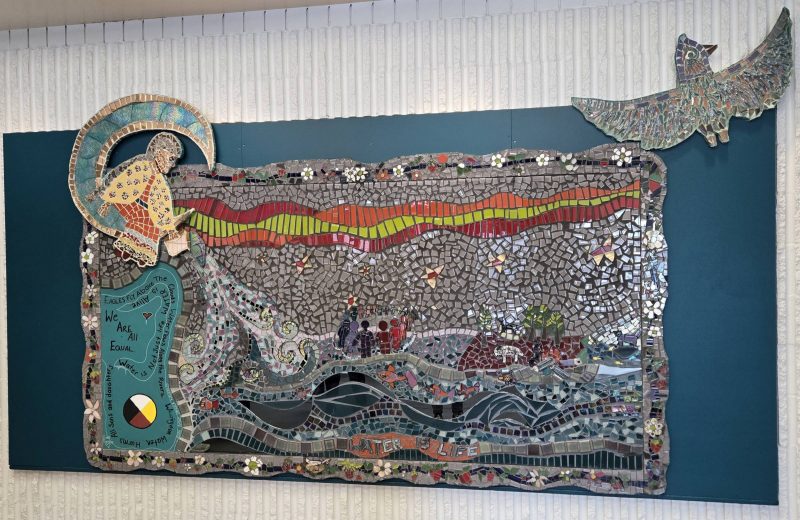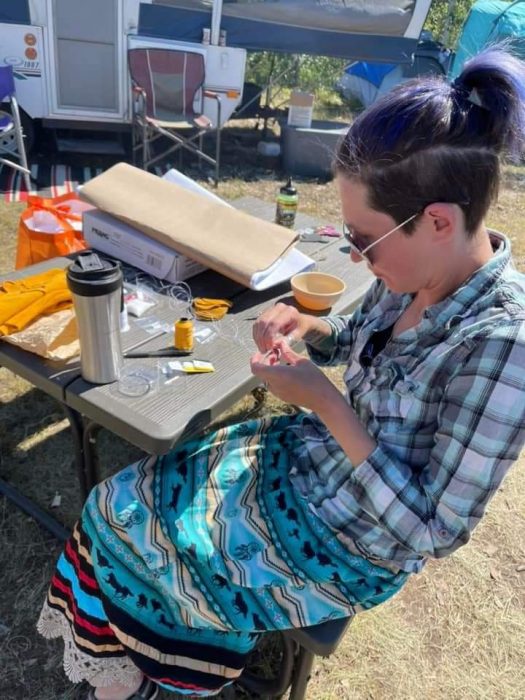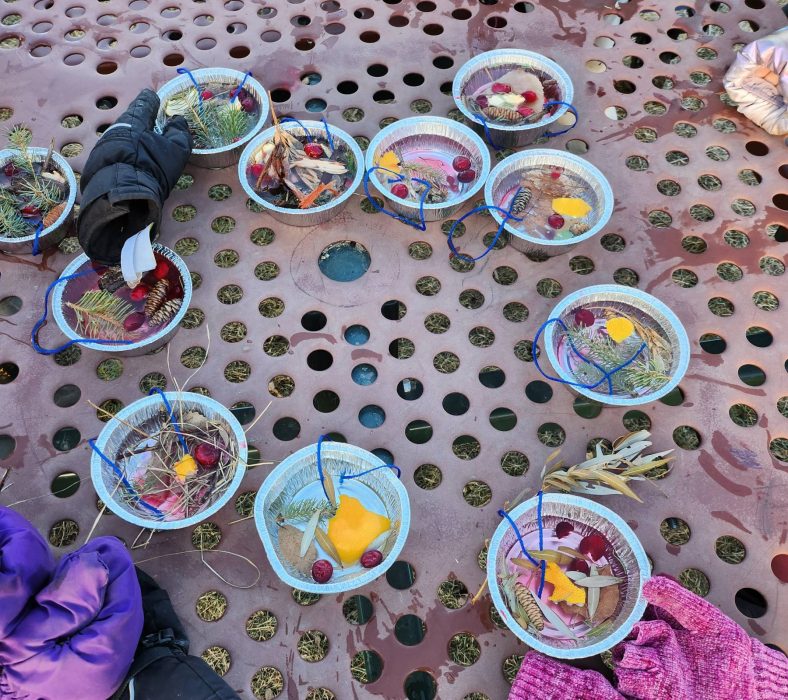
Kiskinhamakiwin (PromoScience) instructor Ashley Wolfe and students at Ecole Crane discuss the micro-forest planted on school grounds. (Photo by Cathy Page)
Uniting Indigenous and western science education for Manitoba youth
UM researchers receive renewed federal support for land-based STEM education
The Kiskinhamakiwin program, an initiative providing support and mentorship for school-age students in Manitoba, has received renewed federal funding through the Natural Sciences and Engineering Research Council of Canada PromoScience program.
For the past 15 years, Dr. Stephane McLachlan from the UM Department of Environment and Geography has led efforts in relationship-building and networking with Indigenous communities necessary to establish the program across Manitoba.

Grade 7 and 8 students at Arthur A. Leach school created this tile mosaic with artist Ursula Neufeld depicting water teachings by Elder Lucy Ducharme during a 3-part PromoScience workshop. (photo by Ashley Wolfe)
“Indigenous youth are substantially underrepresented in the natural sciences and engineering, accounting for less than 3% of postsecondary students in related fields today,” says McLachlan.
“Through the Kiskinhamakiwin program, we’re trying to proactively address the longstanding systemic barriers and create a more inclusive educational landscape by integrating both Indigenous Knowledge with STEM fields.”
An expanding partnership of communities and educators
With this renewed funding, the program will extend its network of partner communities and educators beyond its initial scope. The cross-cultural mentorship-model will be extended into an urban context through new partnerships with schools across the province and three school divisions, Frontier, Pembina Trails and Seven Oaks. Partnering postsecondary institutions also include UM and University College of the North.
“Urban and rural/northern classes will be “twinned” to facilitate shared learning and cultural exchanges,” says McLachlan. “Guided by the concept of “braided” or “two-eyed seeing”, which values both environmental sciences and Indigenous Knowledge, we strive to provide Indigenous youth with sustained learning and personal growth opportunities and contribute to reconciliation.”

Beading is Math. Ashley Wolfe shares lessons passed down by Metis Knowledge Keeper Carole Frechette about pattern making, bead estimates, and geometry. (photo by Gail Ledoux)
The initiative will also benefit from collaboration with the Wa Ni Ska Tan community research alliance and annual regional youth camps in partnership with community organizations including the Misipawistik Youth and Elders Whichtotan Camp and Debwendon. Camp activities will be complemented by group visits to nearby universities and additional online resources will be generated for use in classrooms across the province and beyond.
Ashley Wolfe is a Land-Based Educator and Community Coordinator in the Environmental Conservation Lab and is the current Cultural Coordinator for the Indigenous Student Center. Wolfe has the traditional name White Thunderbird Woman, her maternal line is of Cree and German descent from the Selkirk St. Peter’s Region and her father’s line descends from Ireland.
“It’s an honour working with youth and Elders to raising awareness about the importance of water through an Indigenous Knowledges perspective,” says Wolfe. “Through the Environmental Conservation Lab, I work with communities to make water testing and environmental monitoring accessible. With PromoScience, we started school divisions last year in hopes of bringing land-based education to schools.”
Uniting Indigenous and western science education
Early year Kiskinhamakiwin classes will focus on arts- and land-based activities, which will be shared virtually. Middle school classes will characterize nearby vegetation and wildlife in field studies of plants, birds and small mammals.

Suncatchers are left to freeze overnight at Ecole Crane. (photo by Ashley Wolfe)
Senior year classes will further quantify how and why the environment has been changing which will be presented in twinned classes and summarized as technical reports that can be shared online.
Annual funding from UM further augments student engagement with campus visits, support with transportation and stipends for student mentors. The ever-expanding member network now includes more than 30 host communities across Manitoba and Northwestern Ontario, along with schools and tribal councils based in Winnipeg and Thompson.
“This meaningful investment underscores UM’s strategic research commitment to advancing research with, by and for Indigenous Peoples in meaningful ways and providing solutions for society,” says Dr. Mario Pinto, Vice-President (Research and International). “I congratulate Dr. McLachlan and the expanded network of community and educational partners for their commitment to building a brighter future for rural and northern youth across Manitoba.”
With a strong foundation and ongoing federal support, Kiskinhamakiwin is set to continue its mission of uniting Indigenous and western science education, paving the way for a more inclusive and diverse future in STEM fields and postsecondary education as a whole.
Research at the University of Manitoba is partially supported by funding from the Government of Canada Research Support Fund.






